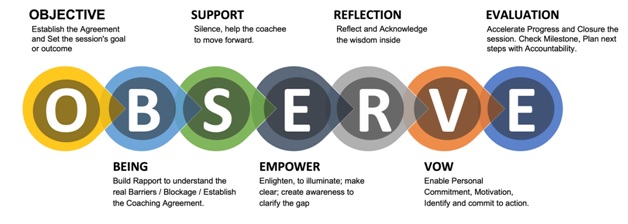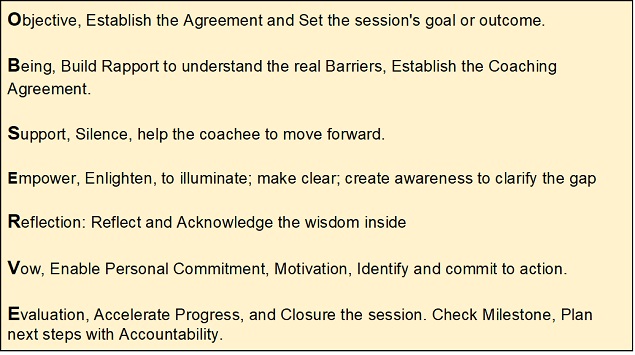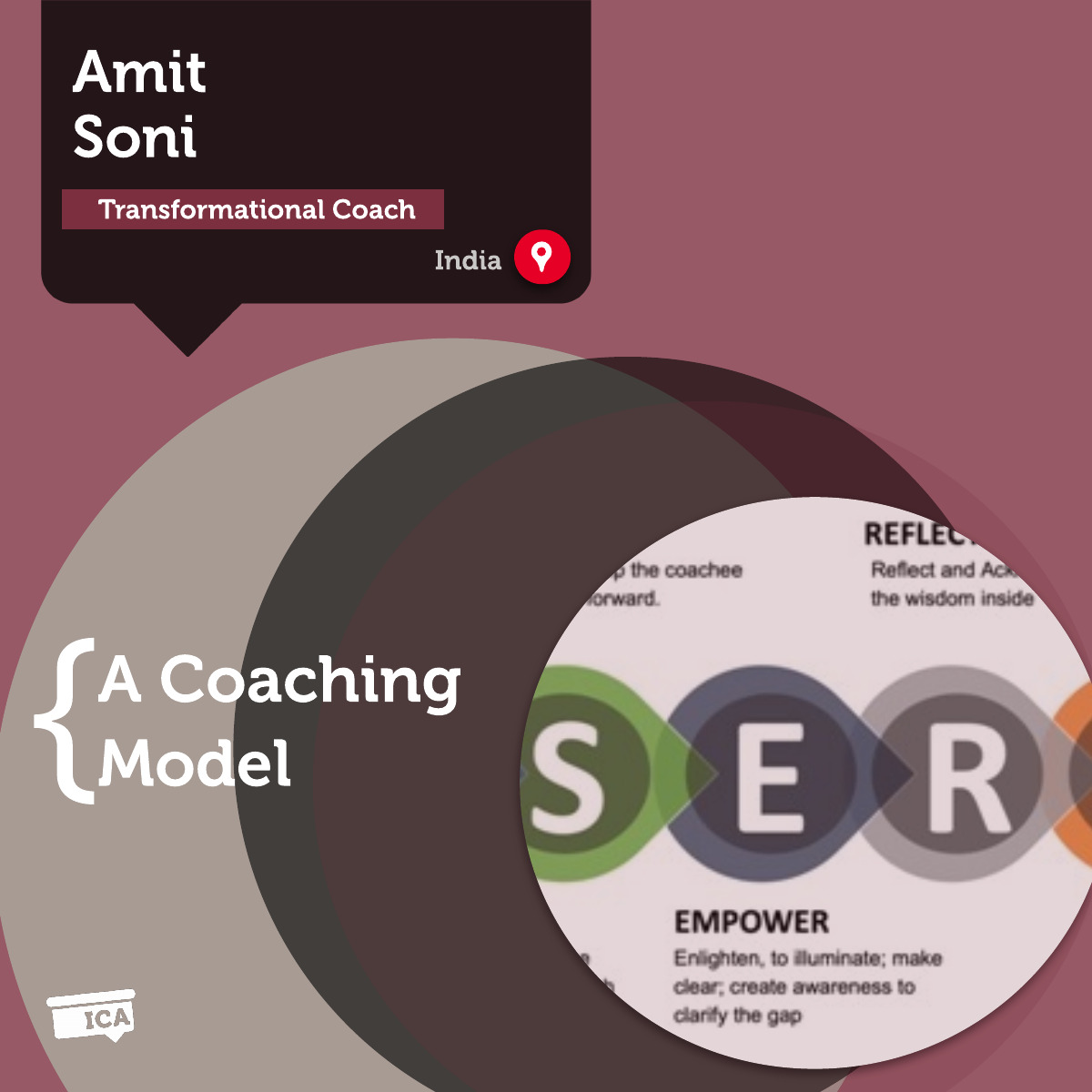A Coaching Model By Amit Soni, Transformational Coach, INDIA
Observe Is “Noticed or Perceive” Supporting Self-Development Through Self-Realization and Self-Awareness

The OBSERVE Model is a coaching framework used for deep exploration to unlock hidden potential and possibilities for transformational coaching experience. This model focuses on supporting self-development through self-realization and self-awareness. The wiki definition of Observe is “noticed or perceive.” With that mindset, This model supports coachees to increase their awareness by being slow, observing their strength, trust, reflecting on themselves, and creating the path for success.
Many research proved that If we have a calm mind, we can become more responsive vs reactive, more creative, and highly innovative. In coaching, it is vital to experience each coaching session with a little deeper discussion to get the best result for the coachees. The coach facilitates and helps the coachee move forward by asking powerful questions that generate awareness. This model focuses on the coachee’s self-transformation, which can be leveraged during the coaching conversation for any goals because it follows the ICF framework and competencies.
Let us use try to understand OBSERVE Model and make it into real-life coaching.
OBJECTIVE
“Objective, Establish the Agreement and Set the session’s goal or outcome”

Setting goals is the first step in turning the invisible into the visible.- Tony Robbins
In the first step of the OBSERVE coaching model, we need to set up the coaching agreement and set up the session’s goal. The goal is to clarify the coachee’s problem and set the outcome of the problem. In addition to this goal clarification, the coach can understand their coachee about the outcome. The coach can support coachees to define a goal that motivates and drives the coachee’s success. Perhaps it is behavior that needs to change or an aspiration to be reached.
A good coaching objective starts with identifying specific that will focus on the coaching, and It needs to focus on a coaching objective with the SMART goals method. SMART means Specific (simple, sensible), Measurable (meaningful), Achievable (agreed, attainable), Relevant (results-based), Time-bound (time-based, time-sensitive).
Questions that can help coaches during the Objective phase of this model include:
- What would you like to talk about today?
- What do you hope to gain from the sessions?
- What are the implications of this problem?
- How will you notice your problem has been resolved?
BEING
“Being, Build Rapport to understand the real Barriers, Establish the Coaching Agreement”
 The second phase of the OBSERVE coaching model revolves around building rapport with a coachee with Empathically listening, which listens to the current emotions and feelings. This is the space you connect and bond with the coachee and understand the deeper meaning of the objective set by the coachee. This phase of the process required a deep level of listening and understanding the coachee’s emotion using Intelligent, emotional techniques. After all, our coachees are inherently resourceful, creative, and complete. An excellent way to practice empathy is with a coachee is to listen sincerely, without speaking, just looking and encouraging with eye contact, nodding, and smiling.
The second phase of the OBSERVE coaching model revolves around building rapport with a coachee with Empathically listening, which listens to the current emotions and feelings. This is the space you connect and bond with the coachee and understand the deeper meaning of the objective set by the coachee. This phase of the process required a deep level of listening and understanding the coachee’s emotion using Intelligent, emotional techniques. After all, our coachees are inherently resourceful, creative, and complete. An excellent way to practice empathy is with a coachee is to listen sincerely, without speaking, just looking and encouraging with eye contact, nodding, and smiling.
Build the trust, hold the coaching space, use humility and compassion to connect beyond the topic. Holding the space for your coachee is the foremost mindset of coaching presence. From this space of nothing, we partner with the coachee by receiving everything they share in that space. Holding the space to work through those emotions can be a decisive moment for the coachee. We don’t judge, criticize or try to fix it; we don’t give advice, make the coachee wrong, or do their thinking for them. Sitting with the coachee in their emotions, just “being” vs. “doing” honors the coachee and meets them exactly where they are.
Questions that can help during this Being phase include:
- What does this mean to you?
- What is the significance of having this goal?
- What is the motivation for bringing this up?
- How will you know that you have a clear understanding of the topic?
- What are you learning about yourself?
SUPPORT
“Support, Silence, help the coachee to move forward”
 The third phase of the OBSERVE coaching model revolves around supporting the coachee to move forward with a powerful question. Moving forward is such a delicate process, and a coach must use the right tools, techniques, and wording to guarantee that progress will occur.
The third phase of the OBSERVE coaching model revolves around supporting the coachee to move forward with a powerful question. Moving forward is such a delicate process, and a coach must use the right tools, techniques, and wording to guarantee that progress will occur.
A coach can also leverage silence during the coaching to support the coachee. Silence is a powerful tool that provides room for reflection and an opportunity for questions and ideas to sink in. If you ask a question and seem to fumble on an answer, allow the silence to support their thoughts. When asking for lists of things (values, ideas, etc.), allow silence to encourage more responses. Allow the silence to be a container to be filled which help automatically coachee to connect deeper.
The coachee must have a safe space to learn and reflect to see that a shift occurs. Allowing the space-making listen which listen to the current emotion and feeling of the coachee Support coachee to move forward.
Questions that can help during this Support Phase include:
- Where are you now?
- Where do you want to be?
- What’s getting in the way?
- What else?
- What does it tell you?
EMPOWER
“Empower, Enlighten, to illuminate; make clear; create awareness to clarify the gap”
 The fourth phase of the OBSERVE coaching model revolves around clarifying the gap, trusting that the coachees have their wisdom, and empowering them to access their intuition. In this phase, the coach needs to be connected with the coachee and share observations if the coach feels the coachee is struggling to move forward. The coach may share observations after acknowledging the coachees’ facial expressions, emotional tone, and body language, and noticing any energy shift. Empowering the coachee through powerful questions, a coach helps a coachee to see even beyond the horizon the coachee can see or even imagine at this moment. Empower leads to exploration that can lead the coachee out of the comfort zone, and that is the crucial reason we need to be persistent as coaches in exploration. This can help coachees tune into their thoughts, experiences, actions, and/or emotions and increase awareness around their energy.
The fourth phase of the OBSERVE coaching model revolves around clarifying the gap, trusting that the coachees have their wisdom, and empowering them to access their intuition. In this phase, the coach needs to be connected with the coachee and share observations if the coach feels the coachee is struggling to move forward. The coach may share observations after acknowledging the coachees’ facial expressions, emotional tone, and body language, and noticing any energy shift. Empowering the coachee through powerful questions, a coach helps a coachee to see even beyond the horizon the coachee can see or even imagine at this moment. Empower leads to exploration that can lead the coachee out of the comfort zone, and that is the crucial reason we need to be persistent as coaches in exploration. This can help coachees tune into their thoughts, experiences, actions, and/or emotions and increase awareness around their energy.
Questions that can help during Empower phase include:
- I hear the high spirit in your voice; your energy to me feels strong as you talk about your passion for this idea?
- I don’t hear any excitement in your voice; your energy to me feels low when you speak about this idea?
- How does it feel to you?”
REFLECTION
“Reflection: Reflect and Acknowledge the wisdom inside”

We do not learn from experience… we learn from reflecting on Experience – John Dewey
The fifth phase of the model revolves around coachees recapturing the reflection of their experience. The reflection promotes learning in three primary moments—before, during, and after a task. Reflection in the context of learning is those intellectual and affective activities in which coachees explore their experiences to realize new wisdom. A coach can use phrases like “I want to acknowledge that you have got good awareness ..”
In coaching, when we ask our coachees to describe what they have learned or taken away from our session, we invite them to stop and retrospectively survey their explorations/experiences toward their desired outcome. When we ask coachees to reflect on their coaching session experience, we ask them to assimilate a complex set of issues as they ponder their topic, goals, thoughts, emotions, discoveries, and action plans. This is a very important step as it gives them to boost to plan some actions
Questions that may take on a central role during the reflection phase include:
- What have you accomplished since we started working together?
- What are you most proud of, Beyond the accomplishments?
- Who/how did you have to be to accomplish those things?
VOW
Vow, Enable Personal Commitment, Motivation, Identify and commit to action.

Commitment means staying loyal to what you said you are going to do long after the mood you said it in has left you – Michael Eisbrener
The Sixth Phase of the OBSERVE coaching model revolves around considering the commitment and action of each of the previously identified solutions. This should motivate the coachee and help the coachee feel more committed and action-oriented towards success. The personal commitment will reinforce the coachee’s self-esteem, self-respect, self-worthiness, and self-love. It revolves around implementing the solution chosen in the previous step. The solution is divided into smaller parts that can easily be implemented step-by-step. The coachee should lead this whole process.
The vow is all about taking action with a positive commitment to faster success. This formula is potent and can work in any domain.
Commitment + action = success.
Questions that can help during the Vow phase include:
- What would be the smallest first step for you to move forward?
- With this realization what do you need to do next steps?
- What support mechanisms will you need to support this goal?
- What do you think you will need to do?
- How could you make the tasks/actions more enjoyable?
EVALUATION
Evaluation, Accelerate Progress, and Closure the session. Check Milestone, Plan next steps with Accountability.

During the Evaluation phase of the OBSERVE coaching model, it is assessed whether the entire coaching process was a success or not. This phase is also meant to reflect on how the coaching went and whether the coachee is on the right path to achieve their goals. In this phase, The coach may determine whether the coachee needs everything to accomplish success in the future.
Evaluation is critical to measure the expected changes and impact of the coaching over time. Evaluation is vital to determine if your coaching is on track to meet the coachee’s desired outcome, understand “what works” and identify if the coaching is meeting the expected changes and impacts.
Check milestones, celebrate progress, learn from mistakes, and replan if necessary.
Questions that can help during the Evaluation phase include:
- How successful was this session?
- What would you like to acknowledge yourself for today’s session?
- What did you learn from this period?
- What’s your next step after today?
- Is there another problem that should be discussed?
For Coachees, the Observe Model Approach Can Have a Longer-Lasting Influence Than Other Methods
In conclusion, The OBSERVE model approach can create a more lasting impact than other methods for coachees. This ultimately will facilitate the coachee gaining a higher level of self-awareness that perpetuates personal effectiveness and development. Leveraging this model can bring fantastic value to anyone’s coaching process. Since this takes the ICF Competency models, approach thus this can be more adaptable for any coaching style.
In Summary, the OBSERVE model has six stages. It means as follows:

Learn How to Create Your Own Coaching Model
Your Coaching Model reflects your values,
philosophies and beliefs and must communicate who you will coach
and the problems you will solve. Read more about creating your coaching model
